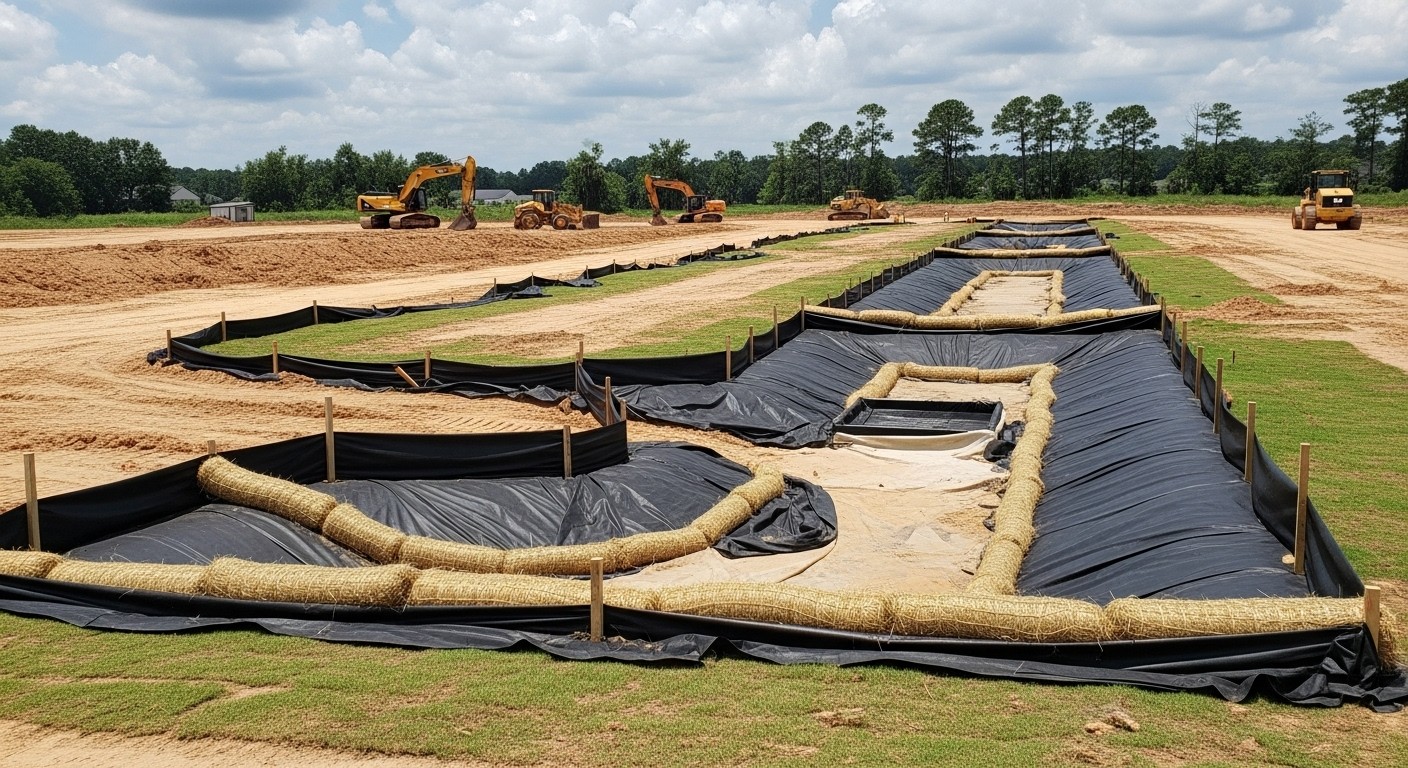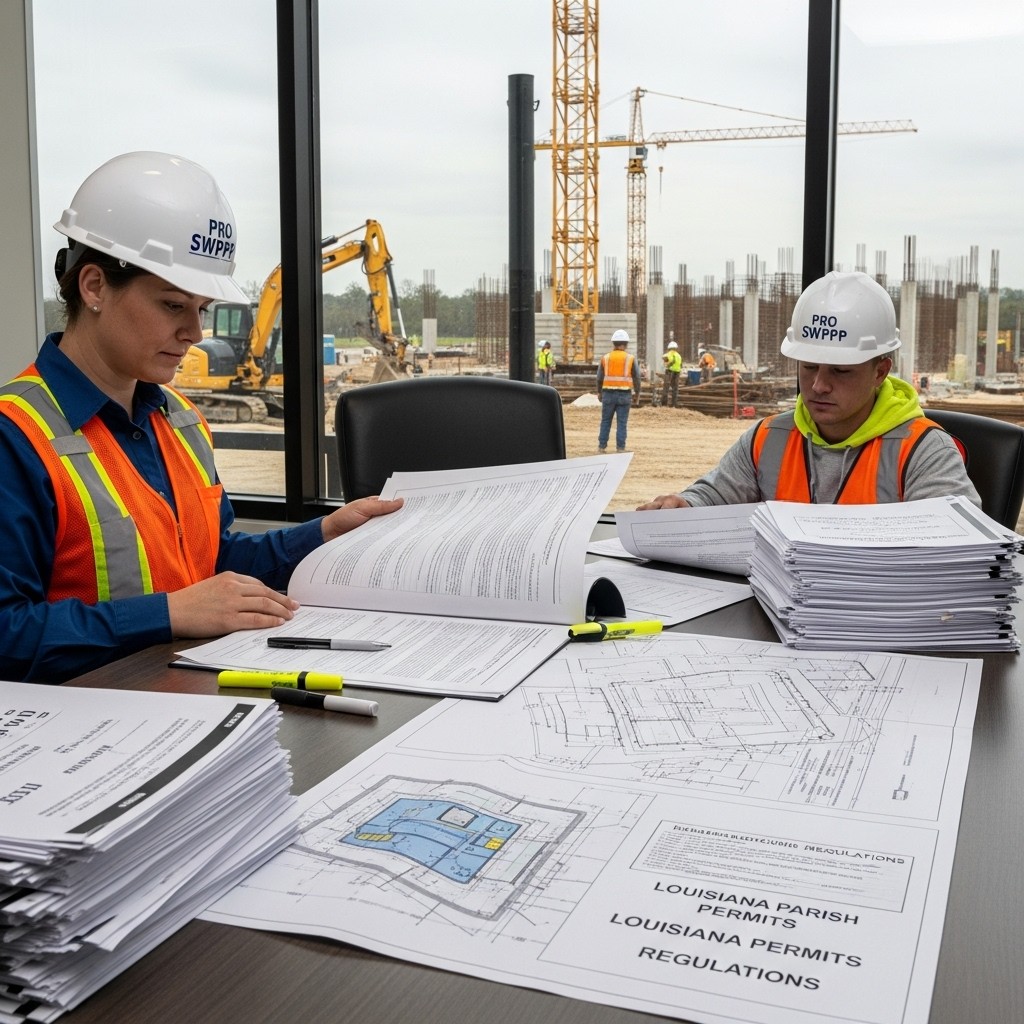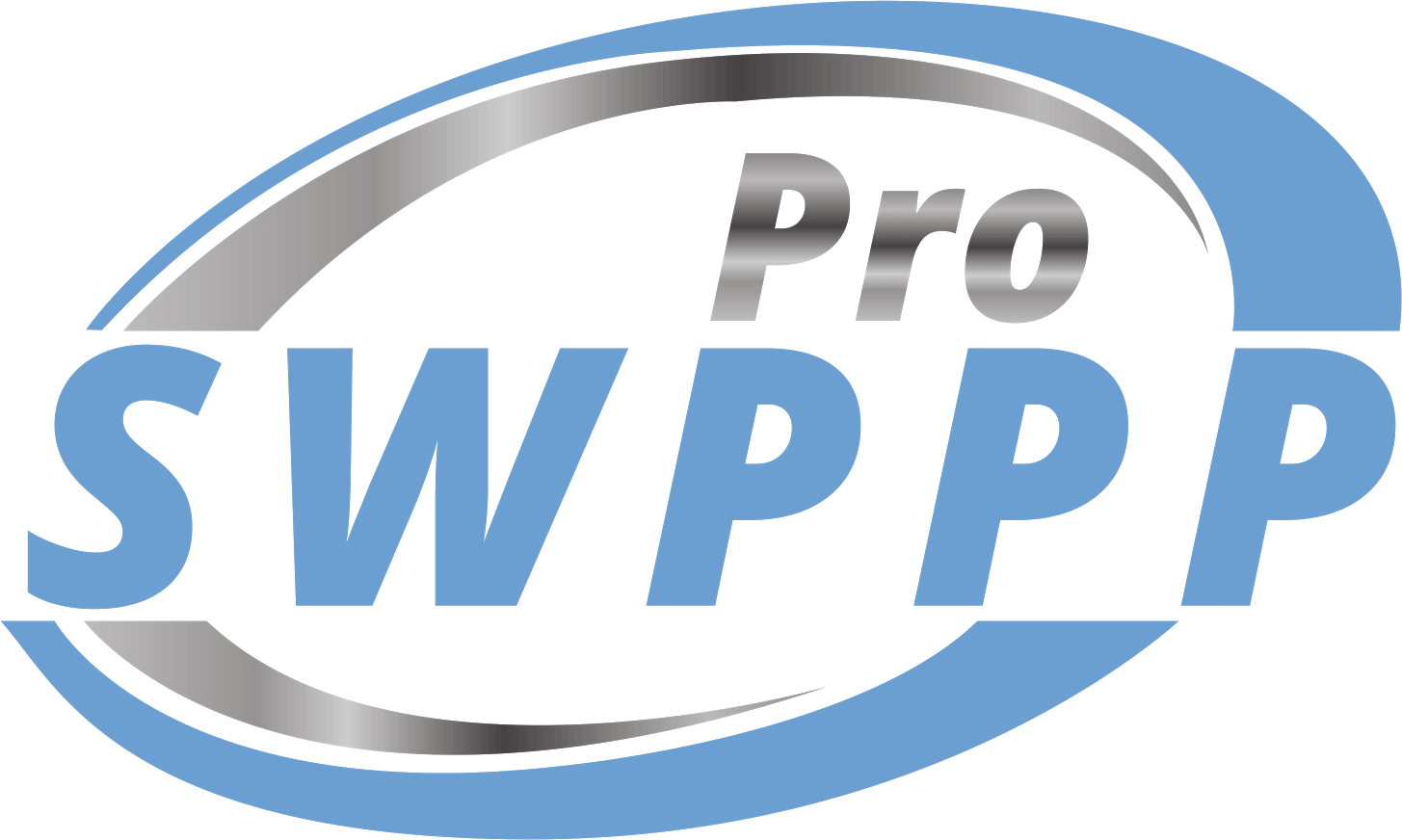Louisiana contractors are getting slammed with stormwater violations (penalties in the thousands) because they don’t know the Louisiana SWPPP requirements. The Louisiana Department of Environmental Quality (LDEQ) isn’t playing games anymore. One wrong move and you’re looking at massive fines that could shut down your project.
Here’s the deal: if you’re disturbing 1 acre or more in Louisiana, you need a Storm Water Pollution Prevention Plan (SWPPP) under the Louisiana Pollutant Discharge Elimination System (LPDES). This isn’t optional. It’s federal law under the Clean Water Act, and Louisiana enforces it hard.
When You Need a SWPPP in Louisiana
The rules are simple but strict.
Any construction project that disturbs 1 acre or more requires both a SWPPP and a Notice of Intent (NOI) permit application. But here’s where contractors mess up — if your small project is part of a larger common plan that hits 1 acre total, you still need the full SWPPP package.

For bigger projects disturbing 5 acres or more, you fall under specific LPDES general permits like LAR100000. These come with extra requirements including annual permit fees and a Notice of Termination (NOT) when you’re done. Miss any of these steps and the LDEQ will come knocking with hefty fines.
Don’t want to mess with all the paperwork and requirements yourself? Save hours upon hours of work and get fully compliant with Pro SWPPP’s Professional CPESC Certified SWPPP services in Louisiana.
What Goes Into a Louisiana SWPPP
Your SWPPP can’t just be some generic template you downloaded. Louisiana requires site-specific plans signed by an authorized person. The Louisiana Construction General Permit (CGP) mandates these core elements:
- Complete description of your construction activity and disturbance area
- Site map showing construction zones, receiving waters, drainage patterns, and Best Management Practices (BMP) locations
- Erosion Control and Sediment Control BMPs with both interim and permanent stabilization practices
- Inspection and maintenance schedules with documented frequency
- Waste management descriptions and control measures
- Certification signatures from all responsible operators
The National Pollutant Discharge Elimination System (NPDES) program requires your SWPPP to be updated whenever construction phases change or you modify management practices. Many contractors forget this and get violations for outdated plans.
Local Parish Requirements That Trip Up Contractors
Here’s where it gets tricky. Parishes like East Baton Rouge add their own layers. You need a Stormwater Management Plan (SMP), a Stormwater BMP Maintenance Covenant signed by property owners, and professional certification confirming correct BMP installation for final occupancy. See how strict Louisiana is for construction projects? That’s why we help project managers get through all of the red tape without wasting time on all of the requirements.

These local requirements aren’t suggestions. They’re mandatory for getting your certificate of occupancy. Skip them, and your project sits unfinished while you scramble to catch up.
Speaking of catching up, contractors in Georgia face similar challenges with state-specific requirements that go beyond federal minimums.
Common Mistakes That Cost Louisiana Contractors Big Money
The biggest mistake?
Thinking projects under 1 acre are automatically exempt. If your small job connects to a larger development plan, you’re subject to full SWPPP requirements under the Construction General Permit (CGP).
Another costly error is not coordinating between multiple operators on large projects. Louisiana requires a single SWPPP covering all operators, but many contractors try to go it alone and create compliance gaps.
Timing also kills projects. Contractors often misunderstand interim and permanent stabilization requirements. Get the timing wrong and you’ll face violations that can halt work immediately.
Not sure what your project needs? Take our SWPPP Quiz or Schedule a Free SWPPP Consultation with CPESC Certified SWPPP Expert Derek E. Chinners. He’s our lead SWPPP contractor with over 17 years of experience. Work with him, and you’ll be 100% compliant, avoiding all of the potential fees you can incur if the stormwater pollution prevention plan isn’t done correctly.
Notice of Intent (NOI) Requirements
Your Notice of Intent tells LDEQ you’re starting construction and have a compliant SWPPP ready. You must file this before any ground disturbance begins. No exceptions.
The NOI includes project details, operator information, receiving waters data, and certification that your SWPPP meets all Louisiana requirements. Submit it too late, and you’re already in violation before breaking ground.
Best Management Practices (BMPs) That Work in Louisiana
Louisiana’s climate and soil conditions demand specific Best Management Practices. Generic erosion control won’t cut it when you’re dealing with intense rainfall and clay soils.
Effective BMPs for Louisiana include properly sized sediment basins, silt fences positioned for maximum efficiency, and stabilized construction entrances that can handle heavy equipment traffic. Your SWPPP must specify each BMP’s location, installation method, and maintenance schedule.
The key is matching your BMPs to local conditions. What works in dry climates fails miserably during Louisiana’s storm season. Professional SWPPP developers understand these regional differences and design accordingly.
Enforcement Trends and What’s Coming
Louisiana is ramping up enforcement to address the state’s unique flood risks and environmental challenges. Digital tools now streamline permit processing through online NOI submissions via LDEQ portals, but they also make tracking violations much easier. Your project is on the list.
Municipal requirements are expanding too. More parishes are requiring long-term BMP maintenance covenants and professional certifications, showing a clear trend toward higher accountability.
Experts predict even tougher enforcement ahead. Louisiana’s environmental challenges aren’t getting easier, and regulators are demanding more adaptive SWPPP strategies that can handle changing conditions.
Getting Professional Help
Smart contractors engage environmental professionals early to prepare and regularly update SWPPPs. Pro SWPPP’s CPESC-certified experts know Louisiana’s requirements inside and out.
Using Louisiana-specific SWPPP templates ensures all LPDES and CGP requirements are met. These templates are available from LDEQ and local parishes, but professional preparation guarantees compliance and reduces violation risk.
Regular inspections per your SWPPP schedule provide documented proof of compliance. This paperwork becomes critical if LDEQ shows up for an inspection or if you face violation claims.
Frequently Asked Questions
Do I need a SWPPP for projects under 1 acre in Louisiana?
Yes, if your project is part of a larger common plan of development that will disturb 1 acre or more total. Individual small projects that aren’t connected to larger plans may be exempt, but it’s best to verify with LDEQ.
How long does it take to get SWPPP approval in Louisiana?
The NOI review process typically takes 7-10 business days after LDEQ receives a complete application. However, you can begin construction immediately after submitting your NOI if you have a compliant SWPPP ready.
What happens if I start construction without a SWPPP?
You’re immediately in violation of both federal and state law. Penalties can include stop-work orders, daily fines up to $37,500, and potential criminal charges for willful violations.
Can I use the same SWPPP for multiple projects?
No, each SWPPP must be site-specific and address the unique conditions of your project location. However, similar projects can use adapted versions of proven SWPPP frameworks.
Who needs to sign my SWPPP in Louisiana?
An authorized representative of each operator involved in the project must sign the SWPPP. This person must have the authority to make day-to-day operational decisions and ensure compliance with the plan.
Louisiana SWPPP requirements aren’t going away, and enforcement is only getting tougher. Get your compliance right the first time and avoid the headaches that sink other contractors. Contact Pro SWPPP today and let America’s #1 SWPPP service handle your Louisiana stormwater compliance needs.
